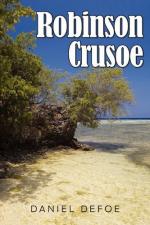The great success of Robinson Crusoe induced its author to write a number of other lives and adventures, some of which were popular in their times, though at present nearly forgotten. One of his latest publications was “A Tour through the Island of Great Britain,” a performance of very inferior merit; but De Foe was now the garrulous old man, and his spirit (to use the words of an ingenious biographer) “like a candle struggling in the socket, blazed and sunk, blazed and sunk, till it disappeared at length in total darkness.” His laborious and unfortunate life was finished on the 26th of April, 1731, in’ the parish of St. Giles’s, Cripplegate.
Daniel De Foe possessed very extraordinary talents; as a commercial writer, he is fairly entitled to stand in the foremost rank among his contemporaries, whatever may be their performances or their fame. His distinguishing characteristics are originality, spirit, and a profound knowledge of his subject, and in these particulars he has seldom been surpassed. As the author of Robinson Crusoe he has a claim, not only to the admiration, but to the gratitude of his countrymen; and so long as we have a regard for supereminent merit, and take an interest in the welfare of the rising generation, that gratitude will not cease to exist. But the opinion of the learned and ingenious Dr. Beattie will be the best eulogium that can be pronounced on that celebrated romance: “Robinson Crusoe,” says the Doctor, “must be allowed, by the most rigid moralist, to be one of those novels which one may read, riot only with pleasure, but also with profit. It breathes throughout a spirit of piety and benevolence; it sets in a very striking light the importance of the mechanic arts, which they, who know not what it is to be without them, are so apt to under-value; it fixes in the mind a lively idea of the horrors of solitude, and, consequently, of the sweets of social life, and of the blessings we derive from conversation and mutual aid; and it shows how, by labouring with one’s own hands, one may secure independence, and open for one’s self many sources of health and amusement. I agree, therefore, with Rosseau, that it is one of the best books that can be put into the hands of children.”




